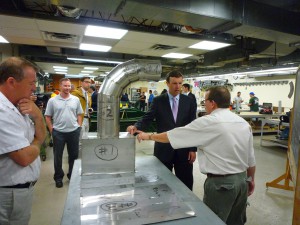
David Roche, President of the Sheet Metal Workers International Association, Local 40 in Rocky Hill Connecticut, wrote the following op-ed published in the Connecticut Post spotlighting the PILMA alliance as a leading source of job creation in the state:
Like many sectors, construction suffered during the Great Recession. And it has taken time to recover. Even in 2012, only half the members of the group I represent, Local 40 of the Sheet Metal Workers International Association, were employed. Today, though, our workers are so in demand that we are actively recruiting students to our training centers. How did this happen? And how can we make sure that we continue to thrive?
The construction and pharmaceutical sectors may not seem like natural allies. One builds with mortar and the other with molecules. Nevertheless, I attribute our recent success in Connecticut in large part to construction projects awarded by the biopharmaceutical industry. These contracts have come about thanks to an alliance between labor unions and drug companies, formalized as the Pharmaceutical Industry Labor-Management Association (PILMA), through which we are dedicated to expanding economic growth, providing good jobs and leading medical breakthroughs.
The companies that comprise the biopharmaceutical industry in Connecticut have come to learn what we know: hiring union contractors makes good business sense because we can put the best trained, safest, most productive construction workers in the state on the job on their capital projects.
To our members, jobs are the bottom line. In the state of Connecticut, we are fortunate that policies such as those supported by Senators Chris Murphy and Richard Blumenthal create the environment in which industry can thrive. In 2011, over 58,000 jobs were supported directly and indirectly by the pharmaceutical industry and today there are even more. Continuous innovation means that new facilities must be renovated, rebuilt and reimagined. That’s where America’s building trades are called in.
There are over 1,600 building trades training centers located in every state in the United States. Here, our members learn the latest technology and cutting-edge techniques to be the highest skilled and best trained workers in the world. This means the pharmaceutical companies can rely on a ready pool of construction craft workers to equip their facilities in order to discover and manufacture new medicines and even cures. Of course, our members also benefit from a thriving pharmaceutical sector in the same way that millions of other Americans do. The skilled craft trades enjoy quality medical care throughout their careers and as a result are healthier into retirement. Within those walls that we built, scientists are finding vaccines against deadly diseases, treatments to manage chronic conditions, and therapies for cancer. New cures and treatments mean that once life-threatening conditions can be managed throughout our members lives, resulting in less costly hospital stays.
Biotechnology in turn benefits greatly from its partnership with labor. The sector has especially rigorous construction needs, requiring, for instance, that lab equipment be replaced after each new drug trial. Unions provide the best-trained and most safety-conscious workers in the state, men and women who can be trusted to handle these challenging jobs. In our interconnected economy, the effects reverberate outward. A healthy biotech sector is good for the construction trades. That adds up to two thriving sectors, which in turn boost the economy at large. And pharmaceutical companies are inventing drugs that will benefit people around the world. In a political environment marred by division and partisanship, in which labor and corporations are all too often at odds, our alliance is a rare success that we must nurture and protect.
David Roche is the president of the Sheet Metal Workers’ International Association, Local 40 in Rocky Hill.


